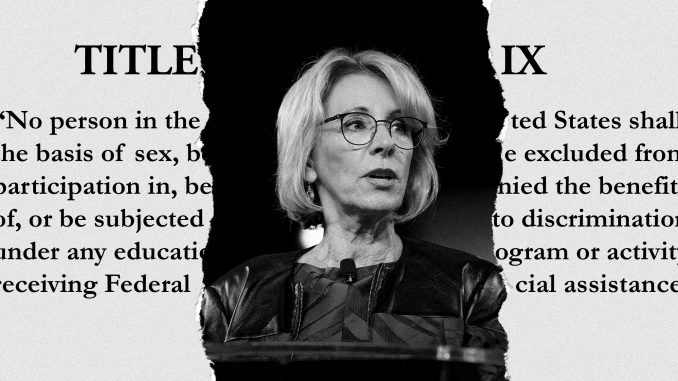
United States Secretary of Education Betsy DeVos proposed a Title IX regulation earlier this month that would change the way institutions of higher education handle sexual misconduct accusations and hearings.
The proposal, announced on Nov. 16, would change Obama-era policies that require institutions to investigate any sexual misconduct they learn of that affects the victim’s education and narrow the definition of sexual harassment. This month’s proposal would only require investigation of formal reports filed for misconduct within the institution’s programs or activities.
The rule also would alter the reporting, investigation and review process for alleged victims of sexual misconduct. It would give schools the option to choose a higher standard of evidence than under the Obama-era regulations when determining whether to reprimand accused students.
“Far too many students have been forced to go to court to ensure their rights are protected because the Department [of Education] has not set out legally binding rules that hold schools accountable for responding to allegations of sexual harassment in a supportive, fair manner,” DeVos said in a release.
“By following proper legal procedures and receiving input on our proposed rule, we will ultimately have a final regulation that ensures that Title IX protects all students,” she added.

The proposal will be open for public comment for 60 days after its publication in the Federal Register. The department is required to include public discourse in its final ruling, but it will not change the proposal itself unless it chooses to do so. The proposed rule was published in the Federal Register on Nov. 29 and the deadline for public comment is Jan. 28.
The Pennsylvania Coalition Against Rape is preparing its public comments for submission, said its policy director Donna Greco.
The proposal could disallow universities from protecting victims because it must consider complainant and respondent requests on the same level, she said. In the past, Greco said, universities could determine the victim and the alleged perpetrator in an incident and provide protections from there.
“The responding party could just say, ‘Well, I didn’t do it, and I deserve to be in the same class. And if you kick me out, that’s a form of punishment,’” Greco said. “It’s really going to tie the hands of Title IX coordinators, potentially, with putting remedies in place to help students that have come forward after being assaulted.”
Temple University currently has three active Title IX investigations, opened in 2013, 2014 and 2017, according to the Chronicle of Higher Education.
“When we receive reports that any student feels unsafe or threatened, we investigate those reports promptly and take appropriate action as quickly as possible,” wrote Andrea Seiss, the university’s Title IX coordinator in an email to The Temple News. “Our goal is to treat each case with compassion and fairness for all concerned.”
Seiss wrote that the university follows its own process for investigating sexual misconduct accusations through the Code of Conduct, in which both parties are heard by the university and an outside adjudicator.
The proposed rule would make survivors of sexual assault more afraid to report their experiences, said Shira Freiman, a junior psychology and criminal justice major and president of Temple’s chapter of It’s On Us, a national movement commissioned by the Obama administration to combat sexual violence.
“It’s going to increase the fear of, ‘No one cares, no one’s gonna listen, no one’s gonna believe me,’” Freiman said.
The proposed rule details universities’ and colleges’ responsibility to handle sexual harassment cases that occur “under any education program or activity.” According to the department’s summary of the regulation, this would not draw a geographic line between on- and off-campus incidents.
Under the rule, the department will categorize sexual misconduct as a sexual act, which eliminates some forms of stalking, Greco said. The proposal more narrowly qualifies harassment in terms of employee exchange of benefit for sexual conduct, harassment that is so “severe, pervasive, and objectively offensive” that it prevents equal access to educational programming and assault or rape as a criminal act.
“Our concern with that is that so many of the acts and threats and behaviors that may not fall under those three, narrow categories still have the outcome and the impact of disrupting a person’s safety and well-being on campus,” Greco said.
UPDATE: This article was updated to include that the proposed rule was published in the Federal Register on Nov. 29 and the deadline for public comment is Jan. 28.


Be the first to comment